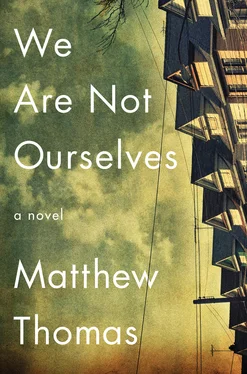The whole way home, Connell replayed in his head what he’d said. I’m a pussy-ass. I’m a pussy-ass pussy. When he got there, his father was on the couch with the headphones on. Connell stood over him and watched him. He watched his hand going back and forth, the index finger raised. His father’s eyes were squeezed shut, as if he was trying to see something he needed absolute dark to see. When the dull murmur coming from the headphones rose to a crescendo, the upward thrusts of his arm lifted his body off the couch. When the symphony lulled, he lay there, eyes still squeezed shut, and his chest rose and fell with his breathing.
Connell dropped his bookbag on the dining room table and headed to the basement. He added a ten-pound plate to either side of the bar and then lay on the bench. Lift it, pussy-ass , he thought, but he couldn’t make it budge. He took the plates off and did a couple of sets of ten.
While he was lifting, he thought of something he could have said to Benny to make him laugh. When Benny asked, “What does it mean?” he could have said, “Pussy-Ass Virgin.” But he only ever thought of that kind of stuff after the fact. He even knew a French expression to describe coming up with witty things too late; that was the kind of pussy he was. His father had taught it to him: Esprit d’escalier , the spirit of the stairs; the thing you think of when you’re already gone. The kids who thought of snappy things on the spot never had to worry about being fat or smart or pussies. You had to have a little meanness in you to do it. You had to be willing to embarrass other people sometimes. He didn’t want to have to embarrass other people. Deep down, or not even that deep, he knew he was a pussy-ass; maybe that was why it hadn’t been that hard for him to say what he’d said to Benny.
Maybe it was partly his father’s fault that he was such a pussy-ass. His father was a nice guy. Not that he told Connell not to fight back. The last time Connell had come home with a swollen eye, his father had said, “You have my permission to fight back. You’re not going to get in trouble with me.” But Connell hadn’t wanted to risk it. He hadn’t wanted to get a JD card or suspended or worse. He’d been thinking of his permanent record. He hadn’t wanted to ruin his chances of getting into a good high school or having a good life. He’d needed the teachers on his side, the principal. He’d wanted to get out of the neighborhood. Well, now he was going to a fancy school in Manhattan on scholarship. You couldn’t get more out of the neighborhood than that. Maybe he was a total pussy-ass, but at least he wasn’t an asshole like Benny.
He put the plates back on. He thought, Lift it, motherfucker , and then he said it aloud, like he was uttering the password to a new club. He got the bar up once; it came crashing down with a loud bang. His father didn’t come running down to see whether he’d hurt himself, because his father couldn’t hear anything with those headphones on.
Pussy-ass pussy , he thought. Motherfucker .
Ed had been working in the garage since she woke up. He had emptied much of its contents into the backyard, which now bore an uncomfortable resemblance to those of their immediate neighbors. It was a hot May morning, and sweat was pouring off him.
“I’m taking Connell,” she said.
“Okay.”
“You sure you don’t want to come?”
“I’m a little busy.” He gestured to the clutter. She felt bad taking the boy, who probably should have been helping him with whatever this project was, but she couldn’t face those houses alone again.
In the car, Connell found Z100 and turned the volume up.
“How come you’re not telling me to turn it down?”
“It’s not that loud,” she said.
“Dad doesn’t let me turn it up when he’s driving. He says he needs to concentrate.”
“I don’t mind.” She started tapping the fingers of her free hand on the door. It was a song she’d heard while driving to work. Connell smiled at her, and she felt like the favored parent for a change. He’d always gravitated toward his father — a consequence, she suspected, of her having returned to work so soon after he was born. It probably wasn’t just that she was out of the house so much; it was also the way she got on the phone with her friends after dinner as though punching the clock at a second job. But some of that, she saw now, had been the need for escape. There would be less of that when they moved. She could begin to be more of the mother he wanted.
“Your father’s got a lot on his mind,” she said generously.
“He’s the most uptight person in the world. He grips the wheel with both hands the whole time. You can’t say anything to him.”
When they first met, he would pick her up with one elbow hanging out the window, like a cool guy in a movie.
“You don’t know what it’s like to be an adult,” she said. “There’s a lot to think about all the time.”
“He wants me to have the change ready for the tollbooth about a mile in advance. He gets all weird about it. He freaks out if I don’t have it in my hand, counted out. And then he throws it in that bin with all this force, like he’s throwing a baseball. It’s so awkward. What’s up with him? Why is he so weird?”
She had been a passenger of Ed’s herself. It was as if he was doing brain surgery instead of driving a car. “Fathers are just weird sometimes,” she said. “Don’t think too much about it.”
“It’s so embarrassing.”
A song came on that he liked and he bobbed his head up and down and tapped his hands on the dashboard.
“I want your input,” she said. “I’ve been looking at all these houses and I can’t tell what I think anymore.”
“What about Dad? What does he say?”
“Your father and I have a difference of opinion right now about whether we should move,” she said. “I’m going to have to ask you to be a man about this. I might need you to keep quiet about it for a while if we find a place we really like.”
“Sure.”
She felt her foot falling heavier on the gas pedal as they hit the Grand Central Parkway. A new spirit entered the car. She had a conspirator. She could feel it making a difference already. She felt freer than Ed as she drove. She was cool enough to appreciate her son’s music, to pick up a little speed on the highway, to let the coins wait until they got right up to the booth. She had enough energy to make important changes in her life, to pull her husband out of a pit, to yank her whole family out of the maw of a neighborhood that threatened to swallow them whole.
• • •
Gloria gave Connell the full open-armed treatment. She seemed inordinately glad to meet him. At first Eileen thought it was a salesperson’s come-on, but then it occurred to her that by existing, Connell might have been confirming that his mother wasn’t a fantasist.
“I’ve found the perfect place for you,” Gloria said. “It’s gorgeous. It’s slightly out of your price range, but only slightly. I want you to consider it. It’s as close as you can get to your perfection with the money you can spend.”
They drove up Palmer Road toward Yonkers, past the stately complexes of condos and leafy gardens, but turned off it before they’d gone too far. She had studied the area enough to know that this was an outpost of Bronxville with Bronxville post office boxes and Yonkers schools. But the schools wouldn’t matter with Connell heading into the city in the fall. A sign announced — either proudly or defensively, it was hard to tell which—“Lawrence Park West.”
The area was promising. It was a mixture of old and new homes, but the road was curvy and lined with enormous oaks, and between the wooded plots, she caught glimpses of stucco Tudors with carriage houses, and even what may have been a tennis court. They turned onto a wider street and the road flattened and the houses were all easy to spot but majestically elevated above the road. They stopped in front of a gray colonial with overgrown hedges and columns that linked the porch on the first level to one on top. Stone pillars flanked the driveway, and next to the front walk was a jockey holding a lantern. His red coat had been chipped and bleached to pink in the sun. The house looked as if it had been built sometime in the first half of the century, but built well, and it was twice as large as the houses she’d seen the week before. She was hopeful.
Читать дальше
Конец ознакомительного отрывка
Купить книгу












